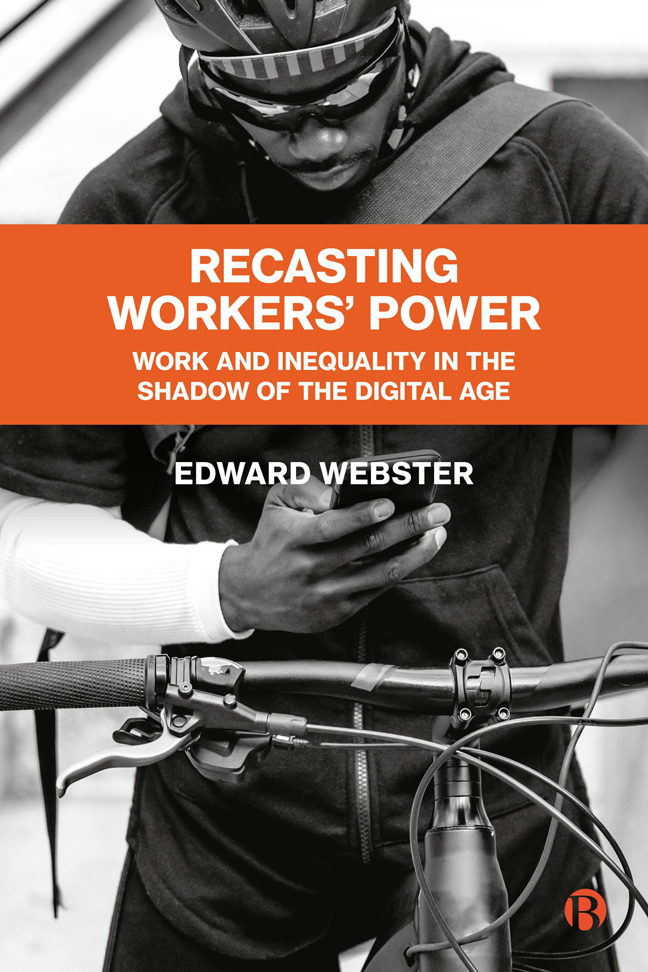Book contents
- Frontmatter
- Contents
- List of Figures and Tables
- List of Abbreviations
- Preface
- 1 The End of Labour? Rethinking the Labour Question in the Digital Age
- 2 Precarious Work after Apartheid: Experimenting with Alternative Forms of Representation in the Informal Sector
- 3 Neo-liberalism Comes to Johannesburg: Changing the Rules of the Game
- 4 Divided Workers, Divided Struggles: Entrenching Dualisation and the Struggle for Equalisation in South Africa's Manufacturing Sector
- 5 Authoritarian Algorithmic Management: The Double-edged Sword of the Gig Economies
- 6 Crossing the Divide: Informal Workers and Trade Unions
- 7 Global Capital, Global Labour: The Possibilities of Transnational Activism
- 8 Changing Sources of Power and the Future of Southern Labour
- Index
2 - Precarious Work after Apartheid: Experimenting with Alternative Forms of Representation in the Informal Sector
Published online by Cambridge University Press: 23 January 2024
- Frontmatter
- Contents
- List of Figures and Tables
- List of Abbreviations
- Preface
- 1 The End of Labour? Rethinking the Labour Question in the Digital Age
- 2 Precarious Work after Apartheid: Experimenting with Alternative Forms of Representation in the Informal Sector
- 3 Neo-liberalism Comes to Johannesburg: Changing the Rules of the Game
- 4 Divided Workers, Divided Struggles: Entrenching Dualisation and the Struggle for Equalisation in South Africa's Manufacturing Sector
- 5 Authoritarian Algorithmic Management: The Double-edged Sword of the Gig Economies
- 6 Crossing the Divide: Informal Workers and Trade Unions
- 7 Global Capital, Global Labour: The Possibilities of Transnational Activism
- 8 Changing Sources of Power and the Future of Southern Labour
- Index
Summary
The Congress of South African Trade Unions (COSATU) had been at the centre of the internal struggle for democracy since its formation. Therefore, expectations were high in 1994 among its members that South Africa's first democratic government would usher in a worker-friendly labour regime. But from the beginning, the new labour regime proved complex and contested. For employers, labour market flexibility became a mantra as they grappled with intensified global competition. For labour, however, democracy was not delivering on the expectations of more and better jobs, as employers were bypassing the new labour laws.
The world of work was changing and COSATU's membership was not diversifying significantly to include the growing numbers of outsourced, casual, migrant or informal sector workers. This became a concern to the federation as it felt the pressure of large-scale retrenchments and informalisation of employment practices. The labour relations system based on the traditional employer/employee binary was being eroded by labour broker intermediaries (Kenny and Webster, 1998). COSATU responded to these and other challenges in 1997 by setting up a Commission on the Future of Trade Unions, known as the September Commission (after Connie September, Deputy President of COSATU at the time).
Chapter 7 of the September Commission report focused on the rise of vulnerable work and made recommendations on how COSATU should respond. The report categorised vulnerable work into four areas: vulnerable sectors, vulnerable layers of workers (in all sectors), the informal sector, and migrant workers. The report recommended that COSATU commit to the ‘strategic objective’ of organising against vulnerable work on all levels and warned against the consequences of not doing so. For example, it argued that should COSATU not organise in vulnerable sectors its ‘position in the labour market would be weakened, and this would be likely to affect its influence at a political level, and at NEDLAC [National Economic Development and Labour Council]’. Furthermore, if it did not organise ‘vulnerable layers’ of workers in the formal sector, the report warned that ‘COSATU could end up being based in a shrinking section of the working class, as has happened to trade unions in a number of countries’ (COSATU, 1997: Chapter 7).
Despite the report's warnings, over the decades that followed COSATU, and the trade union movement more generally, failed to respond adequately to the rise of precarious and vulnerable work in all its forms.
- Type
- Chapter
- Information
- Recasting Workers' PowerWork and Inequality in the Shadow of the Digital Age, pp. 30 - 54Publisher: Bristol University PressPrint publication year: 2023

